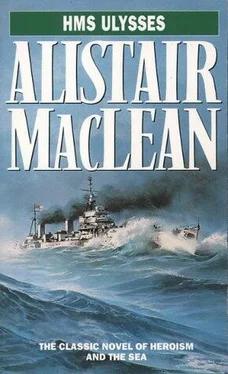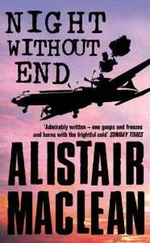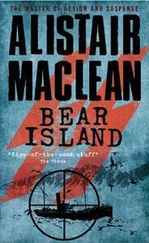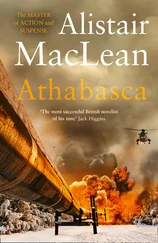The last ships in the convoy were two miles away now, and in the broken seas, at that distance, it was impossible to see whether there were any survivors. It did not seem likely. And if there were, if there were men over there, struggling, swimming, shouting for help in the murderous cold of that glacial sea, they would be dying already. And they would have been dead long before any rescue ship could even have turned round.
The convoy steamed on, beating steadily east. All but two, that is-the Electro and the Sirrus.
The Electro lay beam on to the seas, rolling slowly, sluggishly, dead in the water. She had now a list of almost 15ø to port. Her decks, fore and aft of the bridge, were lined with waiting men. They had given up their attempt to abandon ship by lifeboat when they had seen the Sirrus rolling up behind them, fine on the port quarter. A boat had been swung out on its davits, and with the listing of the Electra and the rolling of the sea it had proved impossible to recover it. It hung now far out from the ship's side, swinging wildly at the end of its davits about twenty feet above the sea. On his approach, Orr had twice sent angry signals, asking the falls to be cut. But the lifeboat remained there, a menacing pendulum in the track of the Sirrus: panic, possibly, but more likely winch brakes jammed solid with ice. In either event, there was no time to be lost: another ten minutes and the Electra would be gone.
The Sirrus made two runs past in all, Orr had no intention of stopping alongside, of being trampled under by the 15,000-ton deadweight of a toppling freighter. On his first run he steamed slowly by at five knots, at a distance of twenty feet-the nearest he dared go with the set of the sea rolling both ships towards each other at the same instant.
As the Sirrus's swinging bows slid up past the bridge of the Electro, the waiting men began to jump. They jumped as the Sirrus's fo'c'sle reared up level with their deck, they jumped as it plunged down fifteen, twenty feet below. One man carrying a suitcase and Burberry stepped nonchalantly across both sets of guard-rails during the split second that they were relatively motionless to each other: others crashed sickeningly on to the ice-coated steel deck far below, twisting ankles, fracturing legs and thighs, dislocating hip-joints. And two men jumped and missed; above the bedlam of noise, men heard the blood-chilling, bubbling scream of one as the swinging hulls crushed the life out of him, the desperate, terror-stricken cries of the other as the great, iron wall of the Electra guided him into the screws of the Sirrus.
It was just then that it happened and there could be no possible reflection on Commander Orr's seamanship: he had handled the Sirrus brilliantly. But even his skill was helpless against these two successive freak waves, twice the size of the others. The first flung the Sirrus close in to the Electra, then passing under the Electra, lurched her steeply to port as the second wave heeled the Sirrus far over to starboard. There was a grinding, screeching crash. The Sirrus's guard-rails and upper side plates buckled and tore along a 150-foot length: simultaneously, the lifeboat smashed endwise into the front of the bridge, shattering into a thousand pieces. Immediately, the telegraphs jangled, the water boiled whitely at the Sirrus's stern-shocked realisation of its imminence and death itself must have been only a merciful hair's-breadth apart for the unfortunate man in the water, and then the destroyer was clear, sheering sharply away from the Electra.
In five minutes the Sirrus was round again. It was typical of Orr's ice-cold, calculating nerve and of the luck that never deserted 'him that he should this time choose to rub the Sirrus's shattered starboard side along the length of the Electra, she was too low in the water now to fall on him, and that he should do so in a momentary spell of slack water. Willing hands caught men as they jumped, cushioned their fall. Thirty seconds and the destroyer was gone again and the decks of the Electra were deserted. Two minutes later and a muffled roar shook the sinking ship, her boilers going.
And then she toppled slowly over on her side: masts and smokestack lay along the surface of the sea, dipped and vanished: the straight-back of bottom and keel gleamed fractionally, blackly, against the grey of sea and sky, and was gone. For a minute, great gouts of air rushed turbulently to the surface. By and by the bubbles grew smaller and smaller and then there were no more.
The Sirrus steadied on course, crowded decks throbbing as she began to pick up speed, to overtake the convoy. Convoy No. FR77. The convoy the Royal Navy would always want to forget. Thirty-six ships had left Scapa and St. John's. Now there were twelve, only twelve. And still almost thirty-two hours to the Kola Inlet...
Moodily, even his tremendous vitality and zest temporarily subdued, Turner watched the Sirrus rolling up astern. Abruptly he turned away, looked furtively, pityingly at Captain Vallery, no more now than a living skeleton driven by God only knew what mysterious force to wrest hour after impossible hour from death. And for Vallery now, death, even the hope of it, Turner suddenly realised, must be infinitely sweet. He looked, and saw the shock and sorrow in that grey mask, and he cursed, bitterly, silently. And then these tired, dull eyes were on him and Turner hurriedly cleared his throat.
"How many survivors does that make in the Sirrus now?" he asked.
Vallery lifted weary shoulders in the ghost of a shrug.
"No idea, Commander. A hundred, possibly more. Why?"
"A hundred," Turner mused. "And no-survivors-will-be-picked-up. I'm just wondering what old Orr's going to say when he dumps that little lot in Admiral Starr's lap when we get back to Scapa Flow!"
CHAPTER THIRTEEN
SATURDAY AFTERNOON
THE Sirrus was still a mile astern when her Aldis started flickering.
Bentley took the message, turned to Vallery.
"Signal, sir.' Have 25-30 injured men aboard. Three very serious cases, perhaps dying. Urgently require doctor.'"
"Acknowledge," Vallery said. He hesitated a moment, then: "My compliments to Surgeon-Lieutenant Nicholls. Ask him to come to the bridge." He turned to the Commander, grinned faintly. "I somehow don't see Brooks at his athletic best in a breeches buoy on a day like this. It's going to be quite a crossing."
Turner looked again at the Sirrus, occasionally swinging through a 40ø arc as she rolled and crashed her way up from the west.
"It'll be no picnic," he agreed. "Besides, breeches buoys aren't made to accommodate the likes of our venerable chief surgeon." Funny, Turner thought, how matter-of-fact and offhand everyone was: nobody had as much as mentioned the Vectra since she'd rammed the U-boat.
The gate creaked. Vallery turned round slowly, acknowledged Nicholls's sketchy salute.
"The Sirrus needs a doctor," he said without preamble. "How do you fancy it?"
Nicholls steadied himself against the canted bridge and the rolling of the cruiser. Leave the Ulysses-suddenly, he hated the thought, was amazed at himself for his reaction. He, Johnny Nicholls, unique, among the officers anyway, in his thorough-going detestation and intolerance of all things naval-to feel like that! Must be going soft in the head.
And just as suddenly he knew that his mind wasn't slipping, knew why he wanted to stay. It was not a matter of pride or principle or sentiment: it was just that-well, just that he belonged. The feeling of belonging-even to himself he couldn't put it more accurately, more clearly than that, but it affected him strangely, powerfully. Suddenly he became aware that curious eyes were on him, looked out in confusion over the rolling sea.
"Well?" Vallery's voice was edged with impatience.
Читать дальше
Конец ознакомительного отрывка
Купить книгу












